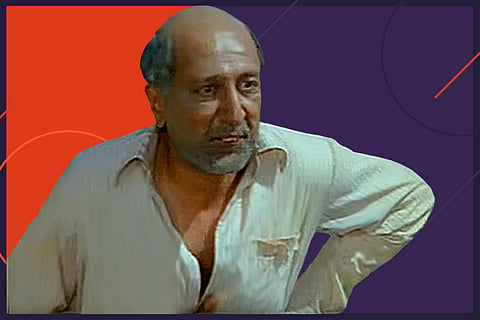
- Reviews
- Power List 2024
- Cannes 2024
- In-Depth Stories
- Web Stories
- News
- FC Lists
- Interviews
- Features
- FC SpecialsFC Specials

In this weekly series, Rahul Desai lists 50 of Hindi cinema's favourite "third wheels" – that is, memorable characters whose roles are little more than fleeting cameos and little less than supporting turns – since 1990. There will be no particular order: just a colourful recollection of emblematic faces who've left us craving for more.
Over the years, the quintessential "mad local" stereotype – a crazed, scary, disheveled old character designed solely as a pre-emptive measure of the film's ominous environment – has become a staple offering in the horror/slasher-movie landscape. So often, we've seen a young, callous group warned by this withered face within minutes of the opening. Of course, they ignore this person (usually a deluded survivor of dark forces) and live to regret it.
However, one of Hindi cinema's most iconic predecessors of this character appeared in a gangster drama. Mukul Anand's Amitabh Bachchan starrer Agneepath (1990) remains my earliest memory of the movies. Despite its obvious inspiration from the West, its heightened figures – from a Godfather-ish Vijay "Deenanath" Chauhan to Mithun Chakraborty's lovably loyal Krishnan Iyer M.A. to Danny Denzongpa's ominously oily Kancha Cheena and even Vikram Gokhale's pensive Commisioner Gaitonde – remain entrenched in my filmy mind.
But it's Tinnu Anand's crazed villager, Nathu, who truly advertised the spirit of Chauhan's bloodthirsty battle of retribution.
A far cry from the villainous roles he normally excelled at, an inspired Anand here represents the dying soul of the Mandwa that was unjustly taken away from Vijay's parents. He is senile, desperate and lonesome – dismissed as a harmless nuisance in the land he once loved. He is their last connection to the past, still garnering hope for a future against all odds. A natural successor to his legacy would be Rakhee's "Mere Karan-Arjun aayenge" routine in Rakesh Roshan's 1995 reincarnation blockbuster, given that Nathu, too, believes that the son of the slain will return in style to reclaim the corrupted village from Kancha's murderous hands. Not to mention the timeless and wise old mandrill Rafiki, from The Lion King, whose slow march into insanity is redeemed when Simba actually returns to avenge the death of his father. The resemblance is uncanny.
ALSO READ – TOP 50 MEMORABLE BOLLYWOOD CHARACTERS: ROMY ROLLY FROM LUCK BY CHANCE
Such characters symbolize the "madness paradox" in storytelling – they are shown as deranged old fools in an environment full of sound temperaments, whereas they are in fact the only signs of sanity, goodness and bravery left in a world full of weak, defeated conformists. They are both visionaries and misfits; Anand makes sure we empathize with his delirium by being the only one who believes in the laws of revenge narratives. His ageing body prevents him from being a real threat to anyone, which is why he becomes more of a commentator and predictor of heroism – a quality he probably once aspired to embrace, till the pressure perhaps defeated his mind. His raspy, unabashed cries of "Viju beta" even leaves the film's protagonist confused about whether to be moved by or wary of the man's affection.
Best Scene
"Beta, tame aa gaya na?" Nathu inquires emotionally, when he first sees Vijay Chauhan quietly showing his girlfriend, Mary (Madhavi), the village he plans to reclaim. He knows it's time. He is virtually signaling a change in the script's mood, laying bare the hero's imminent plans to launch an attack. One can imagine he has waited for decades, convinced of the fact that redemption will occur one day. Like many intuitive relatives he senses Vijay's motivation so that we do, and lends the moment an air of dramatic inevitability.
This is a telling scene in which Vijay, for a few seconds, observes the frail, pathetic man – an embodiment of his land's decay – before turning away to wipe a tear and vow eternal vengeance. "Tame aa gaya, kaka," he whispers. Nathu holds onto him and weeps, digesting the magnitude of this moment. He promptly launches into a trademark tirade ("Saala haraami log") – broken, breathless, angry – against the cowardly village in the background. Once again, nobody is listening. The "common man" then flings a rock at the fancy windows of the establishment.